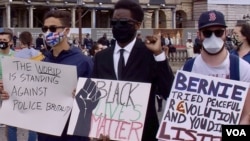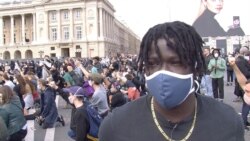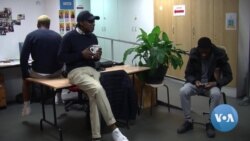Omer Mas Capitolin sipped coffee as he joked with local youngsters one recent sunny evening. On a stoop nearby, neighbors enjoyed the last rays of a fading sun — a testament to tiny apartments and the dearth of parks in this grungy slice of Paris.
As a police car drove past, the young black and ethnic Arab men hanging out in front of Capitolin's community center paused to eye it warily.
“We have a particularly violent squad in this neighborhood,” Capitolin said. “They can [check a person's identity documents] several times a day — even throw tear gas at youngsters who are just talking together.”
Founder of the Maison Communautaire pour Développement Solidaire (Community House for Inclusive Development) center in the city’s ethnically mixed Belleville neighborhood, Capitolin and his team of lawyers and counselors have spent years coaching minority youngsters about their rights and opportunities.
Now he is seeing his sometimes lonely crusade for minority empowerment captured in a broader call against police violence here, partly touched off by George Floyd’s death in the United States.
In cities across France, thousands have joined demonstrations in recent days, echoing a broader global uprising against discrimination. In Europe and the United States, protesters have pulled down statues linked to colonialism and slavery, even as politicians and businesses promise change.
In France, the racism allegations — colliding with the country’s colorblind egalitarian creed — have sparked soul-searching and sharp divisions.
Now, as protests multiply, some wonder if the tide is turning.
“They’re giving me hope,” said Souleymane Fofana, 20, who frequents the Belleville community center. He is a veteran of police checks, he said, but the legal advice he’s received has helped.
“We’ve learned our rights, the things we can do, like filming police,” Fofana said. “That helps a bit.”
New protests, old story
Last week, 20,000 protesters defied a coronavirus ban on gatherings to demonstrate in front of the main Paris courthouse. Many brandished #BlackLivesMatter posters and sported T-shirts carrying the smiling face of Adama Traore, 24, who died in police custody north of Paris in 2016. His cause of death remains under investigation, but Traore’s family contends it was similar to Floyd’s.
Other protests have since taken place here and elsewhere, gathering thousands more.
“I’m here for many reasons — inequality and racism against blacks, police violence,” said Ivorian Fidel Nzenzi, 18, who joined a Saturday rally in front of the U.S. Embassy in Paris. “We want to have more rights.”
In low-income neighborhoods across France, the sometimes explosive relations between police and ethnic minorities, and minority youth in particular, are an old story.
Countrywide riots erupted in 2005, after the death of two ethnic African teens fleeing police. The simmering tensions, particularly in France’s gritty suburbs, or banlieues, were captured in a popular film, Les Miserables, that was up for an Oscar this year.
A 2012 Human Rights Watch report accused French police of unlawfully targeting black and Arab young men and boys, while a 2017 report by France’s human rights ombudsman found young black and ethnically Arab men were 20% more likely to face police checks.
Another ombudsman report found police had systematically discriminated against a group of young Parisians over three years.
The youngsters filmed some of the incidents.
“But that doesn’t mean that police discriminate systematically,” ombudsman Jacques Toubon told Agence France-Presse, appearing to reject a broader generalization.
Rights activists and youngsters say the two-month coronavirus lockdown — leaving many poor families cooped up in small apartments — simply inflamed existing inequalities and tensions. In April, riots broke out in some Paris suburbs after a young motorcycle driver collided with a police car.
"The same population targeted for police abuse was also worst hit by the virus itself, and was often the front-line workers,” said Paris-based Lanna Hollo, senior legal officer for the Open Society Justice Initiative.
Government on the line
The escalating tensions rub against President Emmanuel Macron’s 2017 campaign promise for an “uncompromising” fight against police violence. Macron has yet to comment publicly on the protests, although he is scheduled to address the nation Sunday.
His government, however, announced a series of reforms this week, including banning controversial chokeholds, including the kind allegedly used on Floyd in the United States.
"Racism has no place in society, let alone in our Republican police," Interior Minister Christophe Castaner said Monday, while dismissing accusations of systemic racism within the force.
Activists have dismissed the announced reforms as insufficient.
“They place the problem as an individual problem — a few bad apples in the police,” Hollo said. “There needs to be a whole structural reform of the institution, not micromeasures.”
French police offered a mixed reaction. Some angrily dismissed accusations of systemic racism while acknowledging individual abuses. A March 31 Interior Ministry study found the majority of French citizens had a broadly positive image of police, with 80% finding officers acting professionally during interventions.
“The police as an institution is not racist,” Matthieu Valet, of the Indépendant des Commissaires de Police, a labor union, told Le Parisien newspaper.
Yet in a handful of news media reports, some minority officers suggested the opposite.
A policewoman who self-identified as North African on BFMTV said she realized racial slurs her counterparts were using could also apply to her. When she was transferred to southern France, the message was clear, she said, “that I didn’t belong.”
“There’s been a sort of omertà, or silence, within the police force,” said Hollo of Open Society. “That’s starting to break.”
But at the Belleville community center, Capitolin is skeptical of any seismic shift.
“In terms of a public awakening, we can say there has been a change,” he said. “But do I believe the government will do something about it? No.”









